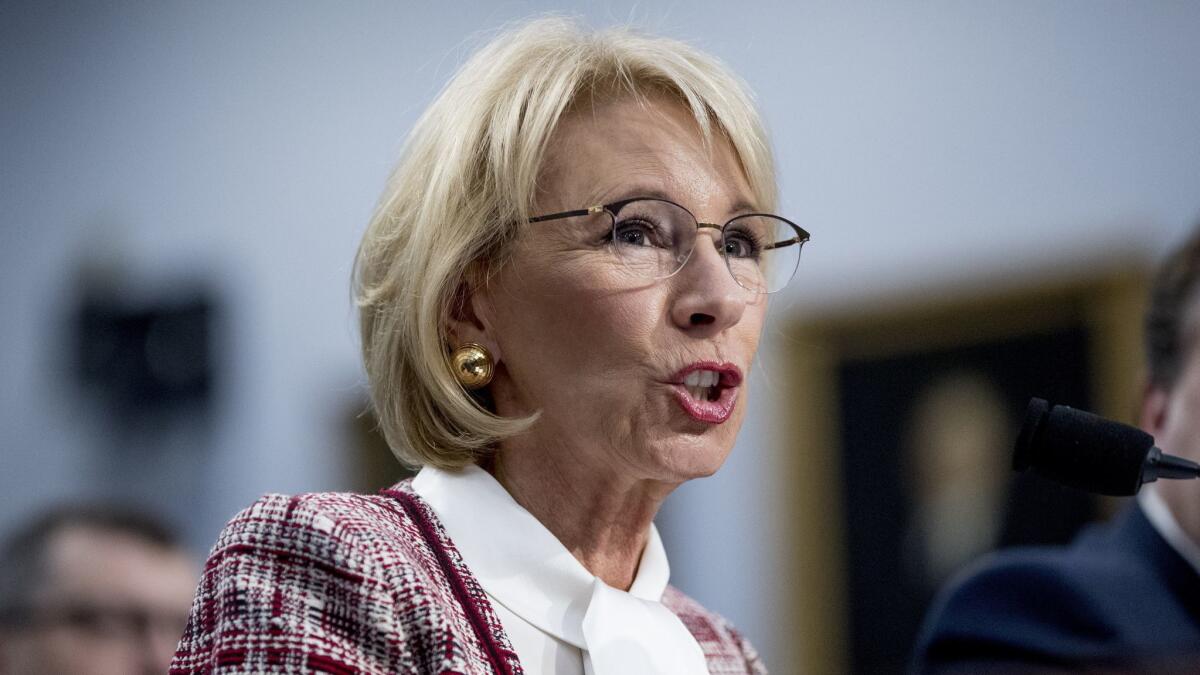Betsy DeVos defends proposal to cut education spending and Special Olympics funding

- Share via
Reporting from WASHINGTON — Education Secretary Betsy DeVos on Tuesday defended her request to cut billions of dollars from the agency’s budget, and Democrats attacked her plan as outrageous and damaging to students who need the most help.
Democrats were also cold to DeVos’ plan to use the federal tax code to support private-school scholarships, suggesting that the secretary’s priorities will face another tough year in Congress.
“I believe this budget is cruel, and I believe it is reckless,” said Rep. Rosa DeLauro (D-Conn.), who leads the education subcommittee of the House Appropriations Committee and presided over the hearing Tuesday. “I really am left with a very serious question for you: How can you support this budget? I mean that genuinely.”
Lawmakers singled out a range of programs targeted for cuts or elimination by the Trump administration, such as the $17.6 million supporting the Special Olympics.
“I still can’t understand why you would go after disabled children in your budget. It’s appalling,” Rep. Barbara Lee (D-Calif.) said.
Even the top Republican on the panel, Rep. Tom Cole (R-Okla.), said that while some proposed reductions make sense, others are “somewhat shortsighted.”
DeVos responded that she was forced to make difficult decisions to control spending, but she appeared to be realistic about her chances.
“This reduction is similar to last year’s request, and the year before that as well. I acknowledge that you rejected those recommendations,” she said.
Overall, the budget plan would cut more than $8.5 billion, about 12%, from the Education Department. Programs that would face cuts include one that supports after-school activities for children in impoverished communities, as well as a grant program for textbooks, equipment, counseling services and other needs for schools. That pool of money — the Student Support and Academic Enrichment Program — also underwrites school safety efforts, including mental health services and safety equipment.
“We’ve proposed this particular program elimination because it’s been thinly spread and not that effective on any particular thing,” DeVos said.
DeVos was more enthusiastic in promoting her own chief cause: a $5-billion tax credit plan to help children attend private schools. She refers to the initiative as “education freedom.”
The proposal faces long odds for approval, especially in the House, where Democrats are in control.
DeLauro dismissed the idea as a “tax scheme” and an “unregulated, unaccountable” effort to fund private school vouchers.
The proposal would give individuals and corporations a 100% tax credit for contributions to state-sanctioned scholarship funds, meaning that donors could get back their entire donation through federal taxes. The money would be given to students to help pay for tuition at private schools and for other expenses.
Democrats also pressed DeVos on a report from the advocacy group Network for Public Education, which found that the federal government wasted up to $1 billion on charter schools that never opened, or that opened and then closed because of mismanagement and other reasons.
DeVos replied that more school options, including charters, are needed.
“When you have experimentation, you’re always going to have schools that don’t make it, and that’s what should happen,” she said.
DeVos also faced questions about her decision to withdraw Obama-era guidelines regarding student discipline. The guidance had warned school systems that they might be in violation of federal civil rights law if they discipline students of color at a disproportionately high rate compared with white students.
“Are you saying that the problem really is that black children are just more of a discipline problem?” Rep. Katherine Clark (D-Mass.) asked.
DeVos sidestepped a discussion of why discipline rates frequently differ by race but said the previous guidance amounts to a quota system for disciplinary action.
“No child should be treated or disciplined differently based on his or her race or color,” DeVos said.
In another exchange, DeVos declined to say whether she believes schools should be allowed to discriminate against students based on their sexual orientation or gender identity. Rep. Mark Pocan (D-Wis.) pressed her on the matter.
DeVos said, “We have laws that cover discriminatory efforts, and our Office for Civil Rights has continued to be very diligent in investigating any allegation of discrimination and will continue to do so.”
Pocan replied, “So is that a yes or is that a no?”
DeVos said, “We follow the law as defined.”
More to Read
Get the L.A. Times Politics newsletter
Deeply reported insights into legislation, politics and policy from Sacramento, Washington and beyond. In your inbox twice per week.
You may occasionally receive promotional content from the Los Angeles Times.










